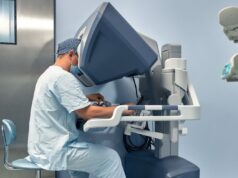Is ChatGPT refined enough to be able to be used in orthopaedic practices yet? The use of ChatGPT and other AI tools in orthopaedics has been discussed ever since ChatGPT’s release in November 2022. In orthopaedics, where intricate decisions and quick responses are paramount, AI holds promise to augment the expertise of orthopaedic surgeons, improve patient outcomes, and streamline clinical workflows. ChatGPT, one of the notable AI technologies, leverages natural language processing to comprehend and generate human-like text responses, making it a valuable asset in patient communication, clinical decision support, and medical education within the realm of orthopaedics.
Recent research has evaluated the performance of ChatGPT alongside other AI models in orthopaedic settings. When prompted with orthopaedic queries, ChatGPT exhibited a commendable accuracy rate of 76.7%, outperforming its counterparts Google Bard and BingAI. Furthermore, ChatGPT demonstrated the ability to provide clinically relevant information sourced from academic literature with remarkable consistency, underscoring its potential as a knowledge repository for orthopaedic professionals. However, despite its proficiency in certain areas, ChatGPT exhibited limitations in clinical management suggestions, often deviating from established standards of care and omitting critical steps in patient management. This highlights the importance of human oversight and ethical considerations when integrating AI technologies into clinical practice. Moreover, while ChatGPT showed promise in patient education and communication, it struggled with eliciting critical medical history from patients, indicating the need for further refinement and contextual understanding to enhance its utility in clinical encounters.
Despite these challenges, the application of ChatGPT in orthopaedics holds significant promise. It can assist orthopaedic surgeons in differential diagnosis, recommend appropriate imaging modalities, and optimize treatment plans based on evidence-based guidelines. By leveraging AI technologies like ChatGPT, orthopaedic professionals can enhance decision-making processes, improve patient outcomes, and ultimately advance the field of orthopaedic care. Realizing the full potential of ChatGPT and other AI models in orthopaedics requires addressing several critical issues, however. Ensuring data privacy, mitigating biases, and establishing clear guidelines for accountability are paramount to maintaining ethical standards and fostering trust in AI-driven healthcare solutions.
Continuous updates and enhancements to AI models like ChatGPT are necessary to keep pace with advancements in orthopaedic research and clinical practice. By integrating next-generation AI technologies into their workflows, orthopaedic surgeons can gain valuable insights, improve patient care, and stay abreast of the latest developments in their field. While ChatGPT shows promise as a valuable tool in orthopaedic healthcare, its integration requires careful consideration of ethical, privacy, and accountability concerns. With ongoing research, refinement, and collaboration between AI developers and orthopaedic professionals, AI technologies like ChatGPT have the potential to significantly enhance the delivery of orthopaedic care and improve patient outcomes in the years to come. Whether or not to start incorporating ChatGPT as a tool in orthopaedic practices is left to the discretion of each practice.
Sources:
Is ChatGPT ready for orthopedic patients?
Artificial intelligence and ChatGPT in Orthopaedics and sports medicine
Artificial intelligence and ChatGPT in Orthopaedics and sports medicine
ChatGPT and large language models in orthopedics: from education and surgery to research





